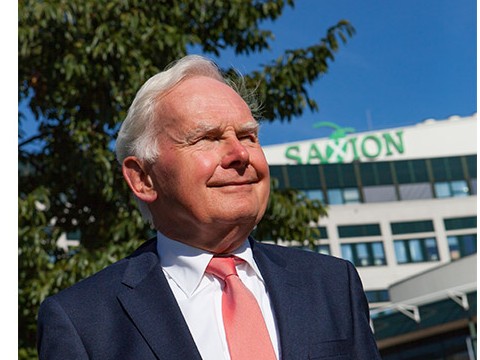
The unstoppable rise of digitalisation in combination with new advancements will result in dramatic changes to the global economy over the next decade. In the Netherlands too, this development will lead to a new industrial revolution: ‘Smart Industry’. “Get involved or get left behind!” says independent business consultant Ben Prins.
It’s sometimes known as ‘The fourth Industrial Revolution’, and in Germany they call it ‘Industrie 4.0’. But that’s a slightly boring way of describing what will be a dynamic and all-encompassing shift within manufacturing, thinking and working – and ‘Smart Industry’ is far from boring. Around a year ago, on 11 November 2014, Dutch Minister Kamp of Economic Affairs accepted delivery of the ‘Action Agenda for Smart Industry’, which was initiated by several parties: FME, TNO, the Dutch Ministry of Economic Affairs, the Confederation of Netherlands Industry and Employers (VNO-NCW), the Dutch Chamber of Commerce and the Nederland ICT organisation. They believe that Smart Industry fits within the Netherlands’ top-sector policy and they regard the ICT agenda as an important cross-sectoral theme.
The Action Agenda outlines what needs to happen in order for the Netherlands to benefit from the opportunities arising from the merger of manufacturing and ICT. Because one thing’s for sure: the combination of the internet with new technologies (such as 3D printing, the Internet of Things, big data and robotisation) is producing a new, innovative manufacturing industry – one which will create hundreds of thousands of new jobs in the SME sector in the coming years, according to forecasts by the above-mentioned initiators.
Independent business consultant Ben Prins is in the midst of these changes. Among other things, he is business development advisor at Wittenborg University of Applied Sciences and member of the Advisory Board for the MIM Honours Programme at Saxion University of Applied Sciences (see box). As an ambassador for Smart Industry, he is primarily focused on the degree programmes in the Netherlands. He is an old hand in the industry, with a wealth of knowledge and experience and limitless enthusiasm. In terms of Smart Industry he sees opportunities everywhere. His mind is full of countless possibilities and no obstacle is insurmountable. Read on for our interview with this energetic futurist.
Ben Prins: “The core principles of Smart Industry are automation, zero defect manufacturing, flexible production, chain collaboration, customer intimacy and value creation based on big data. Manufacturing must be faster, better and more efficient. That’s essential now that natural resources, energy and water are becoming increasingly scarce. We’re moving towards continual and real-time monitoring of complex production processes: 100% in control. Mechatronics – the combination of mechanics, electronics and informatics – plays a key role. The Netherlands has the potential to lead the way, but we need to take action now if we’re to succeed. This is not just the latest hype; in a few years’ time, Smart Industry will be integrated in every self-respecting company. Mark my words.”
‘Techies must have business skills, and vice versa’
“I think it’s because many entrepreneurs and managers of companies – and also educational institutes – have not yet realised the urgency of these developments. Existing corporate cultures can get in the way and there is often fear of change. There is also a certain reticence. People are afraid to collaborate with competitors because they’re scared that their data will be stolen. To overcome those fears, you need insight into what’s going to change and what that will mean for you. That’s difficult because the pace of change is so rapid that entrepreneurs don’t know when to jump on board or how to get started. Nor do they know where to find people with the right competences to implement Smart Industry within their company, so they take a wait-and-see approach.”
“That’s right. It’s a matter of ‘eat or be (b)eaten’! Thankfully there are plenty of companies that are already on the right track, perhaps without even realising that it’s Smart Industry, such as by connecting their manufacturing execution systems with ERP. It doesn’t all have to be done at once. Step-by-step changes are fine too.”
“In my view, process, product and chain innovation can only be successful in combination with social innovation. At the end of the day, it’s about people. That’s why I continually stress that it’s essential to pay attention to the human aspect and the corporate culture, in addition to focusing on technology, robotisation and automation. I’ve noticed that, when talking about Smart Industry, the importance of human capital is often only mentioned as an afterthought, yet that is possibly the most important factor in innovation.”
“As an entrepreneur, first and foremost you must realise that an innovative corporate culture is essential for ‘smart’ business. Create a culture of openness in which innovation and initiative are valued and appreciated. That stimulates employee creativity.
Furthermore, new collaborative partnerships are crucial to your success and to provide access to new expertise and new markets. Chain collaboration soon leads to innovation, whether technical or otherwise. But that’s also one of the obstacles. Companies are often not even used to sharing knowledge internally, let alone with other companies. The fact is that you can only benefit from the opportunities that Smart Industry offers by sharing knowledge with one another. In order to facilitate chain collaboration of this kind, which is so important, ten ‘Fieldlabs’ have been created so far (see box, Ed.), and the Action Agenda aims to add more in the year ahead.
Smart Industry requires people to have new competences, so retraining is urgently needed. And it seems that educational institutes need to be given a wake-up call too because the current offering is still very limited. Universities and the private sector will have to work together much more closely in future. Investment, in terms of both time and money, is key to success. Moreover, you have to be bold enough to take a close look at your current operational processes and existing business model and to make radical changes.”
“People who can combine technology with management are in great demand. ‘Techies’ must have business skills, and vice versa. The management must also have an understanding of the technology. However, the fact that educational institutions were barely involved in drawing up the Smart Industry agendas concerns me. After all, today’s students are tomorrow’s CEOs. But so far, the Dutch education sector has also failed to recognise the true significance of the latest developments. I firmly believe that education forms the basis. There’s urgent need for greater integration between the private sector and education. Large educational institutes tend to lack flexibility – as do large companies, by the way – so it can sometimes take years before a new degree programme or professorship is implemented. That’s why I see the most chances for smaller companies and education programmes. They are more flexible, have shorter communication lines and can therefore take action and make decisions more quickly. The good news is that both Saxion and Rotterdam University of Applied Sciences have already set up a Smart Industry professorship, and Windesheim University of Applied Sciences in Zwolle has added a minor in Smart Industry to its education portfolio.”
‘The fact that educational institutions were barely involved in drawing up the Smart Industry agendas concerns me’
“I’m now involved in providing guidance to students who are setting to work for the start-ups of engineering graduates – young entrepreneurs with small businesses that are innovating like crazy and thinking up the most amazing products. But those products have to be marketed, and they themselves often lack the ability and the competences to do that successfully. We’ve hooked up those young entrepreneurs with business students who will write a business plan just for them. That means the students have to learn a lot more about Smart Industry: robotisation, the Internet of Things, nanotechnology, you name it. It’s a very practical approach to a strategic agenda, and everyone is really enthusiastic. I’m looking for more high-tech companies that would like to be part of this development. It’s a matter of give and take; in return for their time and money they gain energetic youngsters with fresh new insights and new knowledge.”
“Smart Industry is the future and it can’t succeed without social innovation – that’s an essential factor in boosting the productivity and enthusiasm of the people within your organisation.”

Fieldlabs
Fieldlabs are real-world environments in which companies and knowledge institutes can take a targeted approach to developing, testing and implementing Smart Industry solutions. They also reinforce the ties with research, education and policies related to a specific Smart Industry theme.
SMARTfood
There are currently ten Fieldlabs, and ‘SMARTfood’ is one of them. This collaborative partnership is aimed at transforming the Dutch manufacturing industry into a world leader in smart solutions for the fully automated production, cultivation and distribution of fresh fruit and vegetables. This approach also offers a solution to the global challenge of healthy, safe and sustainably produced food. The solution can be applied more broadly to the cultivation of flowers and plants, and also to other industries in the longer term. The organisations behind the Fieldlab are InnovationQuarter, Lacquey, TU Delft and TNO.

Who is Ben Prins?
Ben Prins is managing director and owner of PMC and an independent business consultant. In addition he works closely with the Italian company Magina Srl (Rimini), which he represents on the Dutch market under the name of Magina Srl. Netherlands.
Ben is also active in the education sector. He is:
- Member of the Advisory Board, Honours Programme MIM, Saxion School of Excellence
- Lecturer and Student Supervisor, Saxion University of Applied Sciences/Academy Marketing & International Management
- Lecturer and Student Supervisor, Saxion University of Applied Sciences/Academy Hospitality Business School
- Business Development Advisor, Wittenborg University of Applied Sciences
- General Advisor, Dutch Marketing Platform NIMA
- Member of Smart Industry Platform
- Member of the Dutch RoboNED Robotics Platform.
Source: Bol: © iStock.com/Emevil